#and beliefs. To better understand OneSelf
Explore tagged Tumblr posts
Text
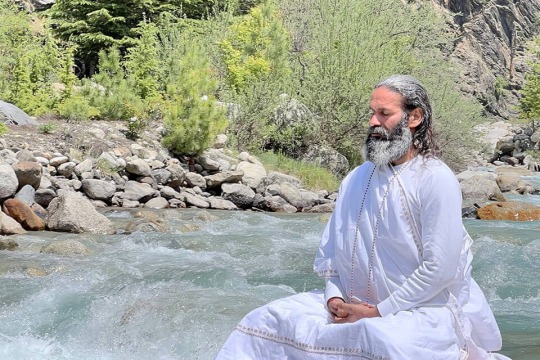
Knowing OneSelf involves introspection, reflection, and a willingness to confront one's own thoughts, emotions, Patterns, and behaviors. It requires honesty and acknowledging one's strengths, weaknesses, values, and beliefs. To better understand OneSelf, it can be helpful to engage in practices such as journaling, meditation, or therapy. These practices can provide an opportunity for reflection and Self-discovery and can help one gain clarity on one's own thoughts and feelings. Ultimately, knowing OneSelf is a lifelong process that requires ongoing Self-reflection and a willingness to learn and grow.
JOIN OUR YOGA COURSES ✅ AND FOR MORE DETAILS 👇🏻✔️ . . CONTACT: +919997224320 . WEBSITE: https://artdvine.com/ GMAIL: [email protected]
#Knowing OneSelf involves introspection#reflection#and a willingness to confront one's own thoughts#emotions#Patterns#and behaviors. It requires honesty and acknowledging one's strengths#weaknesses#values#and beliefs. To better understand OneSelf#it can be helpful to engage in practices such as journaling#meditation#or therapy. These practices can provide an opportunity for reflection and Self-discovery and can help one gain clarity on one's own thought#knowing OneSelf is a lifelong process that requires ongoing Self-reflection and a willingness to learn and grow.#JOIN OUR YOGA COURSES ✅ AND FOR MORE DETAILS 👇🏻✔️#.#CONTACT: +919997224320#WEBSITE: https://artdvine.com/#GMAIL: [email protected]#Hatha#Vinyasa#TherapeuticYogacourses#Therapeutic Yoga workshops#TherapeuticYogaConsultation#Individual(personal) counseling#Tantra#YogaNidra#Vedantic#traditionalknowledgeofMeditationKriyas#yogarishikesh#yogattc
0 notes
Text
What your favorite TWST character says about you :)

As a note before I begin: I saw one of these that shamed malleus and randomly even chenya enjoyers- (claimed that they were pick mes or something? 😭) so i wanted to make one that was more positive out of spite <3 make it more about the writing and why people appreciate the characters. Take each of these with a grain of salt i spose- also a lot of them share similar themes <3
(Aka fans who have different views or even blatantly incorrect views of characters will always exist everywhere, but insulting the entirety of a group solely for enjoying a character, many for different reasons, is probably not a great idea!
I get that sometimes people suck and thats understandable, but quit generalizing ok? Ok.
From a malleus enjoyer who just thinks hes a silly little guy and im tired of feeling like i have to defend myself bc he's my blorbo 😵💫)
Final note: i love unapologetically taking frustration and turning it into something that can make people smile 💕 also i blindly wrote this from 11pm-midnight :))) dividers by @/cafekitsune!

Heartslabyul:
Riddle: you enjoy and/or relate to the idea of healing from the past. Working hard to improve oneself for the ones around you and yourself: creating a healthier environment where you can be happy
Trey: there is immense complexity in things that are seemingly mundane. Digging deeper and deeper to find something truly sweet and heart warming is your joy.
Cater: maybe you relate, or maybe you used to, or maybe parts of the connections made in the past/presence/future dont feel as deep as you truly want them to be. There is something beautiful about a desire for genuine human connection, but also peace in being alone. There is a safe space for you yet, just be patient. 💕
Deuce: you love drive and determination. An endless stubbornness that keeps one going against all odds. Against every person who tells someone they cant. You watch them get proven wrong, and its pure bliss.
Ace: you find the connection between people beyond words heartwarming: even the seemingly simple ones. The ability to have a connection with someone who can get up to some mischief, tease back and forth, yet be there when you need them to be one of the most valuable things.

Savanaclaw:
Leona: Adversity over a lack of belief in oneself is a very difficult thing to overcome- yet it is very possible with the right crowd, the right amount of time, healing, and effort. You think someone's worth lies more than just within their title/job/appearance, but within the fact that they are able to stand back up and keep moving onward despite the odds. The hope for that change, and the ability to get out of bed in the morning on its own is strength.
Ruggie: Despite being through so much trauma at such a young age, recovery happens anyway. Its not perfect, at times the lessons learned are even rough. The survival tactics that once helped are now hard to ditch when theyre not needed anymore, but the ability to smile and joke and keep pushing onwards is something you value in life.
Jack: Self discipline can be both extremely useful as well as harmful in different ways. You find the way people can constantly strive to better themselves at what they love and/or morally to be highly admirable.

Octavinelle:
Azul: People can be cruel. And sometimes that cruelty inspires cruelty. Sometimes its simply used as a way to move on and survive insecurities created from it. Its hard, its a fight, but those insecurities are part of what make people beautiful. They are nothing to be ashamed of, and even the many tactics and smart ways of learning to overcome cruelness can be beautiful too.
Jade: The mind is extremely powerful. Intelligence and knowledge are not the only important things, no. Using that intel to find entertainment in the surrounding world can be exhilarating. Finding and discovering new unknowns: learning their ins and outs until they're a part of you is something you can relate to.
Floyd: speaking of fun- you love what is essentially the written version of a roller coaster. Ups and downs, ins and outs. Every single twist and turn is exhilarating and new. Every different perspective provides new insight into a multitude of different things. You are along for the ride, and you are having a lovely time.

Scarabia:
Jamil: self discovery can be very difficult after purposefully suppressing parts of one's self for a long time. Yet, the healing happens anyway (once again aha <3). People discover new parts of themselves, slowly becoming more comfortable not only with their environment, but how they react to it. The discovery is freedom, and freedom is bliss to you. New traits about oneself bloom like a flower: if not in the soil, then stubbornly in the cracks of cement. You gently take that bloom from the concrete and pot it, placing it gingerly in a beam of sunlight.
Kalim: Happiness isnt only sunshine to the one smiling, but to everyone else around them. It is delightfully infectious. However, happiness isnt a constant. You think emotions all emotions should be experienced rather than suppressed, because holding back sadness for the sake of others is a disservice to one's self. Discovering your own emotions, any range of them, is what makes people uniquely human. If anyone is holding those emotions back- hell, any part of them back, they need to be let out of the cage.

Pomefiore:
Vil: "Beauty is on the inside" is a saying thats been around for a long time, but beauty comes in so many forms. It can come from the stubborn desire to improve one's self: to be kinder, to help those around you, to be good. However it is impossible to be perfect. At times, for some, this can be crushing. People are hurt unintentionally, natural frustration can brew, the wrong actions can be taken: and thats okay. You believe whats important is to pick yourself up and keep going. To err is to be human, and that is beautiful too.
Rook: Error is beautiful. Symmetry is beautiful. Asymmetry is beautiful. A crack in the side walk is beautiful. Small things are beautiful, big things are beautiful. The nurturing of something through endless care is beautiful. The undeniable traits and hobbies of every individual that make them unique are beautiful. You find the endless optimism in finding beauty to be, in itself, beautiful.
Epel: Sometimes people will view others in ways that they wish not to be perceived as. This isnt in our control, as much as we sometimes want it to be. All you can do i be unapologetically yourself. To be you to the utmost degree. To prove those who thought otherwise to be foolish. You find this strength to find value in yourself despite others opinions admirable.

Ignihyde:
Idia: you have depression /j
Ok for real-
Life can be such a cunt. It can beat a person down, down, down and leave them vulnerable enough to fear it. To fear that beating, whenever it may next come. The anxiety of never knowing what or who will come next, or what one could lose. At times it feels more comforting to find a routine in solitude. But you know that the small things that give joy will wiggle their way in with time. The broken will meet people who love and care and find comfort in the companionship of healing, even from the little things: like a new story to read or game to play.
Ortho: You value unconditional support. Support through everything: the good, the bad, the just kind of okay. Knowing that someone can have ones back for every little thing- to be there solely because they care and wish the best for others- is something you look up to and maybe even wish to be for another.

Diasomnia:
Malleus: god damn people can be so hard to read and understand. They are so complicated: they are books you have to pay attention to from start to finish. But once you reach the end, you have a deep seated appreciation for them, and for the ones who stuck around to read your book too. Even if it was just for a fleeting moment: it is a happy moment. As painful as temporary things can be, it is also what you think can make the relationships we love and have loved so valuable.
Lilia: there can be suffering everywhere. There is war. There is famine. But there are also endless new sights to see. New discoveries to be made to help those still going through famine and war. New ways to love and understand people you never thought you'd understand. The development and positive parts of humanity, even though at times it can look bleak, are ever present to you. You love the discovery: of places and of people.
Silver: you believe that there is solace in being your own individual, regardless of who you are bound by blood to. Being shaped my experiences, friends, hardships, and new places are what make a person who they are. You value finding roots in and making your own home.
Sebek: Dedication can be a hard thing to come by, but when it does it can grab someone by the reigns. Using every waking moment to cherish that thing, learn more about it, become better at something, and strive to better ones self can be very admirable to you. But, on the other hand, it also calls for the occasional rest.

OTHER (just for ones I know well enough, sorry!)
Neige: You love kindness despite hardship. One can go through horrible things and still choose to be kind. The world could begin to end, and one could still choose to be kind, because it means everything.
Chenya: Curiosity fuels exploration. It fuels art. It fuels everything. It fuels excitement. It fuels friendships. It fuels medicine. It fuels life. Curiosity is endlessly fun, and you think that is very whimsical
Meleanor: Sacrifice for others can be tragic. Knowing what another person has given up for someone else, maybe even everything, is gut wrenching but undeniably a selfless love to you.
Crewel: There can be kindness in strictness. In teachings, there can be a parental guide. There can be someone who cares for you and undeniably wants you to succeed. They know that you can, so they push you towards it. You want this support.
Trein: Love surpasses time. When the ones we love are gone, the memories of them are still held close, with the love once given to them, we can show to others through advice and guidance that comes with time. You find comfort in that.
Crowley: People are flawed. We all know this, yet despite a persons flaws... however many there may be, there is still something hopeful and human about it. About having those flaws and persisting regardless. You may even like those flaws, and the unashamed desire to press on even with them on display.
Fellow/Ernesto: Live for yourself. This is what you desire. People are often caught up in material or monetary things. After all, we live in a world that required it to survive and even be respected. To throw away those views and simply live as you see fit: regardless as to whether you earn those things or not, is something you admire.
Rollo: Sometimes the attachment we have to those we lost can be painful. Regardless, that pain is proof that there was care and love. The things done for others, whether alive or dead, are done selflessly. Grief can fuel hatred, but it can also be caused by love. To unlearn hatred and learn to love again after the fear of loss is a natural human experience. It is a process you understand and admire those who take the time and strength needed to properly love again.

Thank you for reading <3
Tags <3
@lowcallyfruity @skriblee-ksk @justm3di0cr3 @cecilebutcher @kitwasnothere
@techno-danger @thehollowwriter @distant-velleity @the-trinket-witch @scint1llat3
@beneathsakurashade @qsoap @twsted-canvas @prince-kallisto @kathxrat-01
@sillyslipperybananapeel @jadelover69 @tixdixl @twstinginthewind
#boopshoopsramblings#boopshoopswriting#twisted wonderland#twst#disney twst#riddle rosehearts#trey clover#cater diamond#ace trappola#deuce spade#leona kingscholar#ruggie bucchi#jack howl#azul ashengrotto#jade leech#floyd leech#jamil viper#kalim al asim#vil schoenheit#rook hunt#epel felmier#idia shroud#ortho shroud#malleus draconia#lilia vanrouge#silver vanrouge#twst silver#sebek zigvolt#meleanor draconia#rollo flamme
798 notes
·
View notes
Text
Sun Dominant Themes — 𝐍𝐚𝐤𝐬𝐡𝐚𝐭𝐫𝐚 𝐎𝐛𝐬𝐞𝐫𝐯𝐚𝐭𝐢𝐨𝐧 𝐒𝐞𝐫𝐢𝐞𝐬 (part 1) 𝐨𝐟 𝐩𝐚𝐫𝐭 𝟔
Understanding why planets exalt in certain nakshatras, and houses, will give you an even better foundation for all nakshatra lords. For example, Venus loves being in Revati because this is where it can be unrestricted and as flourishing in its themes as it desires to be, since Revati is peak freedom and transcendence; Ketu loves being in Jyestha because this Scorpio nakshatra continuously releases so much heat which allows Ketu to function at its highest level; and Sun is its best version when it is in Ashwini, because this Aries nakshatra allows the Sun to be as hyper-independent and selfish as it desires to be, and Ashwini being co-ruled by Ketu helps one attract resources to further advance oneself — a theme I am seeing in all the Sun nakshatras.

The symbol of Krittika nakshatra is a sharp knife, and its deity is the fire god, Agni. This emphasizes the heat in Krittika which is connected to its transformative nature. This is seen in the refinement of blades, where the beginning stages involve forging – the process of heating and shaping of the metal – and then heat treating. Resources are used with precision in Krittika, anything unnecessary being cut away as resources are channelled with focus so that one rises to the top. The ruling deity of Uttara Phalguni nakshatra is Aryaman, the guardian of social contracts and hospitality. Aryaman is a solar deity, giving more emphasis to the life-giving heat and brightness of this Sun nakshatra. With Uttara Phalguni, resources are built and sustained through agreements, partnerships and community. Creating mutual connections and valuing generosity will lead to later pleasures, as this nakshatra is symbolized by the back legs of a cot and the word Uttara in Sanskrit can mean "latter," "subsequent," or "final." Uttara Ashada is ruled by the Vishwadevas, the universal gods, this indicating the superior, hyper-independence and highly resourceful nature of this nakshatra. This enables mastery in resource mobilization and strategic planning.

Uttara Ashada Sun Orlando Bloom portrays the character Will Turner in Pirates of the Carribean, who starts out as an accomplished blacksmith by trade – his fantastic swordsmanship a product of his work with tangible resources like metal and tools, demonstrating his ability to make effective use of his environment.
The agency of the self and one's independence is due to the aftermath of the Ugra nakshatras having purged away impurities, propelling Sun nakshatras to focus on one's inner solar light to align with their material plane. This is interestingly explored in films through the so-called "American Dream".
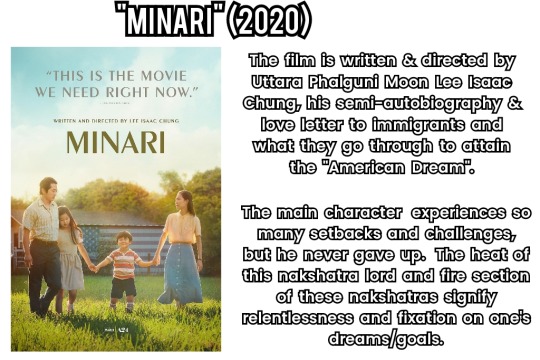
The "American Dream" refers to the belief that anyone, regardless of their socio-economic status and background, can achieve their dreams and make a better life for themselves in a society where upward mobility is accessible to all. The core ideals of this belief are explored in the film The Pursuit of Happyness, starring Uttara Phalguni Sun Will Smith who plays a struggling salesman rising from poverty to attaining professional success as a stockbroker — his character being driven by persistent effort, ambition, and belief in upward mobility.


The theme of the human spirit's resilience in the pursuit of personal dreams is also seen in the film Forrest Gump, starring Uttara Phalguni ASC Tom Hanks who plays a low IQ man who goes through many challenges and still never gave up on his dreams.
Sun nakshatras are more commonly associated with strong themes of ambition, leadership and success.
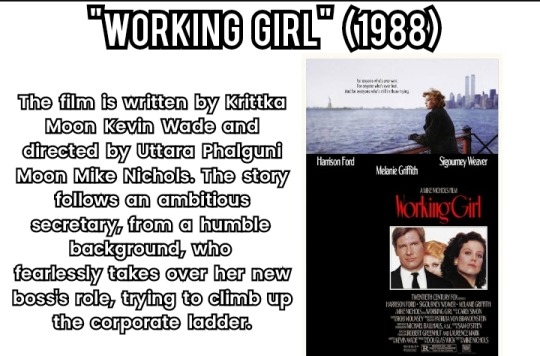
Aja Naomi King has Uttara Ashada Sun and Uttara Phalguni Moon, making her a dominant fire rashi native. She portrays the character Michaela Pratt in How To Get Away With Murder. She is a young woman who is an ambitious overachiever, possessing an intense fire in her and is relentless in chasing after her goals with focused determination.

The character Paris Geller from Gilmore Girls, portrayed by Uttara Ashada Moon native Liza Weil, is known for her relentless ambition, being an aggressive perfectionist, and possessing a fear of failure which mirrors Michaela Pratt’s personality, often the cause of her clashing with others.

Sun natives are able to sacrifice and delay gratification for their goals. The elephant tusk of Uttara Ashada represents enduring strength, the nakshatra also being in the first section of the Capricorn rashi (Saturn supporting themes of endurance and delays). Uttara Phalguni's symbol is a bed or hammock, which represents the rest after hard work and generosity, completing the journey from Purva Phalguni in this final stage. And Krittika being the blade, or razor, signifies it as a cutting force able to slice through obstacles, fuelled by a desire to execute excellence.

Daniel Plainview in There Will Be Blood exemplifies the darker, more ruthless and capitalistic side of this "American Dream" — operating more Ketuvian as he is portrayed by Ashwini Moon native Daniel Day Lewis, drawing parallels with Ashwini Moon Christian Bale in American Psycho (further emphasizing why the Sun exalts in Ashwini, as Ashwini possesses this pure, ungovernable and all-consuming masculine energy which can become self-building).
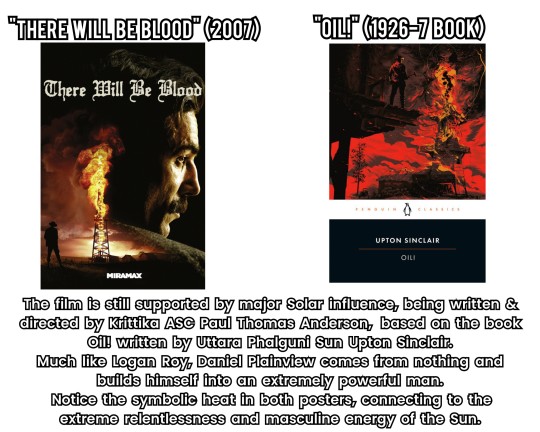
The book Oil! follows the son of an independent oilman who initially idolizes his father's rise to power which has a rags-to-riches quality to it. The book highlights the nefarious strategies that oilmen employ through the main character's sympathy towards the underdog people (oilfield workers), a solar theme which will support further points I'll be touching on. But this corruption of the self from accumulating so much intoxicating power is definitely the darker side of Sun nakshatras.
The character Plainview uses oil as a lucrative resource and leverages it to build his empire, also coming from humble beginnings. He embodies this 'self-made', hyper-independent archetype in which hard work highlights one's determination and ability to turn opportunities into wealth. But the writer of the film, and the author of the novel Oil!, shine light on the emptiness and loneliness of this accumulation.

In the story, The Great Gatsby, the character Jay Gatsby initially comes from a poor background, and he meets a high-status woman who he falls in love with. She becomes one of the reasons for his drive, shaping his desire to escape poverty and become successful.
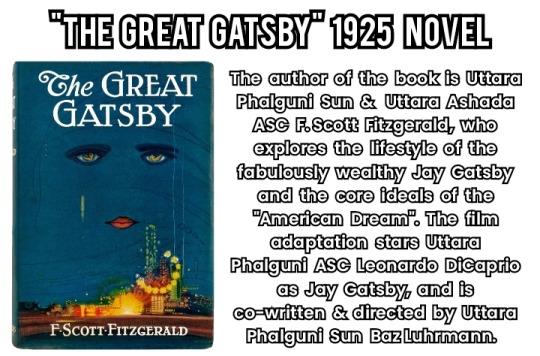
Uttara Phalguni's ability to outwardly evolve to positions of power and have access to things which are symbolic of pleasure and luxury emphasizes the inward radiance and resilience they possess to overcome challenges.
There is a Solar archetype which possesses a type of independence and a resourcefulness that doesn't translate into dominance, but rather into strictly following one's own path of righteousness — remaining strong willed no matter the people one is surrounded by. And there is a level of generosity and duty to this archetype, as Surya, the Hindu Sun god, embodies Dharma (which is related to duty, righteousness and upholding truth).

Will Turner fully embodies this archetype. Even when he's surrounded by pirates, and learns of his familial background of piracy, he stubbornly sticks to what he believes is right. His character has consistently been a strong moral compass in the franchise, upholding righteousness and truth — pointing to the higher leadership and moral integrity important in Uttara Ashada, as this nakshatra is ruled by the Vishwadevas, who are believed to reward those who follow moral principles and righteous paths.
Being burdened with so much duty, Surya (the Sun god) has to endure distant relationships with his close familial bonds. Will Turner mirrors this exactly, his duty as the Captain of the Flying Dutchman (a powerful evolution of his character as he initially started as a humble blacksmith) binds him to a duty higher than his mortal life. Because of this, he could only see his son and wife every once a decade, much like how Surya cannot be close to his sons and spouses.
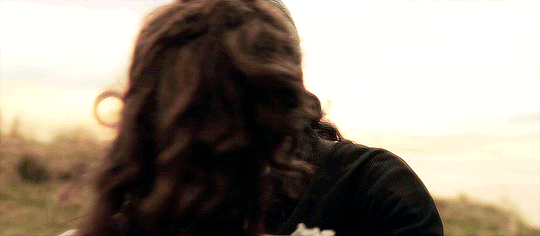
A lot of sacrifices that they endure include cutting away human attachments, although this archetype is moreso explored from the hyper-independent lens in Claire Nakti's Sun Dominant Men video, as they voluntarily become absent fathers/deadbeats from their inherent selfishness — very much opposing the ideals of many Sun gods, but a correct negative manifestation nonetheless.
All Sun gods support this solar archetype of justice, leadership and source of nourishment. Helio, in Greek mythology, personifies the Sun, bringing light to the world, also regarded as the god of sight. Surya is a source of vitality and justice. Ran, the Egyptian Sun god, serves as a great protector, encompassing intense sun rays which ward off evil.
Characters which embody this protective, superior force are often played by Ketu and Sun nakshatra natives (and as Ketu nakshatras are seen as dominant forces in nature, we see how Sun nakshatras adapt in isolation, and become dominant as well, using tools and resources to remain resilient). Claire Nakti already explored this with Mula's connection to Hercules, while I connect the nakshatra Uttara Ashada to characters such as Robin Hood & Tarzan. Just as the Sun gods symbolize a life-giving energy which keeps stability in the universe, George of the Jungle and Tarzan are characters who both protect the jungle and its inhabitants from poachers and other humans with bad intentions — their presence alone warding off evil. Both characters serve as guardians to ensure harmony in the jungle.

The elephant tusk (of Uttara Ashada) often signifies, in many cultures, the protection of wildlife, especially from those who want to exploit and dominate nature. It also symbolizes a tool for survival, and it is associated with higher stature and power. This theme of one being the source of life and resources is seen in Robin Hood, a character which has Uttara Ashada influence. Robin Hood is known for safeguarding the well-being of his community, ensuring that their nourishment and dignity is preserved as he distributes wealth from the rich to the poor.

The bridge between Purva Ashada and Uttara Ashada could be represented by the purpose of Sagittarius — the archer aiming straight for victory. Uttara Ashada can be the release of the arrow, the culmination of focus to execute the final victory, as its stars lie close and pointing to the Galactic Center (signifying the bullseye). Uttara Ashada carries the final stage of the archer's triumph, embodying this legacy after the swift release of the arrow.

Much like Tarzan and George, Robin Hood lives in nature. Sun makes one completely self-sufficient, free from societal and religious roots which holds one back from finding their true essence. And the forest or woods represent a place one can explore their true selves and burn away what's false. The dominance of the Sun is seen in these characters' ability to comfortably live in such a place full of hidden threats like wild animals, bandits, or poachers. While for Ketu this theme signifies their huntress and taming power over the wild, for Sun it signifies their radical freedom and adaptability. Living in the forest, Robin Hood represents the figure of the outsider.
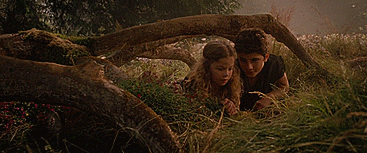
In the 2011 film Red Riding Hood, the character Peter is a woodcutter who embodies the archetype of the lone wolf. He is portrayed by Krittika Moon & Uttara Ashada ASC native Shiloh Fernandez. He knows the forest very well, and is often associated with the pure, wild aspects of it. He is very much like George of the Jungle, in that his love interest is also played by a Magha native, which I found this Sun-Ketu association very interesting.

His free nature and rough exterior (representative of his authenticity, making him a misfit in society) is what misleads the viewers into thinking that he is the werewolf that's been killing the townsfolk, but the truly animalistic and consuming force of the story is the character played by Ashwini Moon Billy Burke.
This lone wolf archetype supports their ability in being resourceful within their surroundings, often seen in survival stories in which the Solar native is stranded and is literally isolated from civilization.

Blue Lagoon (1980) is a survival film about two children living on an island after a shipwreck. Krittika Moon Christopher Atkins plays Richard, who becomes deeply attuned to the rhythms of the island, learning how to make use of the natural resources for their survival.
In the film Mad Max: Fury Road, Uttara Phalguni Sun Tom Hardy embodies this lone wolf archetype through the character Max. The story has a hyper-patriarchal system which is built around the hoarding of resources and exploitation of others. Max is completely removed from this society, prioritizing his own survival and maintaining his autonomy above all else.
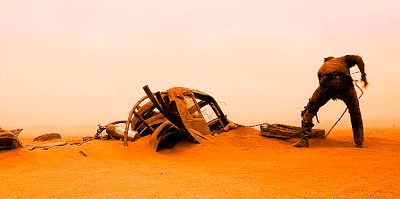
His detachment makes him representative of someone who can solely rely on their resourcefulness and sharp instincts. This film is great as it stars two Phalguni natives; the character Furiosa being portrayed by likely Purva Phalguni ASC native Charlize Theron. Her warriorship is based around seeking a better future for the feminine, which is marked by love and autonomy.
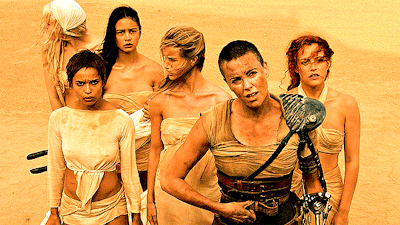
Furiosa, being Venus and an Ugra nakshatra, represents the fight for liberation and happiness, particularly on the freedom of Immortan Joe’s enslaved women, and her own freedom from such a restrictive society unfit for the feminine. The women's rejection of the patriarchy mirrors Max’s independence outside the system. Initially, he aligns with her merely out of necessity as she and the wives possess resources beneficial for his survival. But he treats them as equals, recognizing their autonomy and agency. Max's collaboration with them emphasizes Uttara Phalguni’s purpose of creating alliances and partnerships for higher purposes, supporting the journey that started from Purva Phalguni nakshatra.
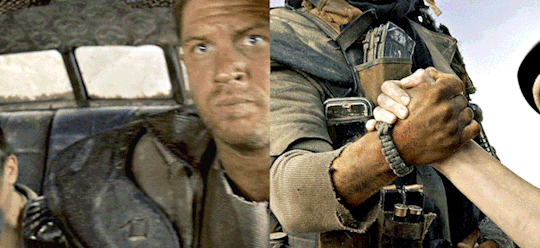
After aiding Furiosa, Max returns to his hyper-independent lifestyle; burning the attachments he formed with the women, and returning to his path that is away from the society.
This ability to survive by oneself, to reshape one's environment, mobilizing resources even in barren circumstances, is a theme for Sun nakshatras — further exaggerating this lone wolf, mysterious archetype (as seen with Max in Mad Max: Fury Road and Peter in Red Riding Hood).

The Sun is the natural giver of light and energy, but it does not receive light in return. Solar natives, often being so self-sufficient, give to others but rarely lean on them for much support. The character Elliot Alderson from Mr. Robot is a hacker, his final achievement towards the end of the series making him a modern day Robin Hood. His mission to expose corruption and empower the oppressed is akin to the Sun being a source of illumination, Krittika especially being known to cut away illusion. He is played by Krittika Sun Rami Malek.

Elliot remains emotionally isolated, as he has noticed that anyone who gets too close to him burns in the end — very similar to how the Sun god, Surya, burns and shines too brightly that his wife, Samjna, runs away from him. Elliot's solitary nature makes him feel extreme loneliness, but he maintains a distance from others, his hyper-independence stemming from his traumatic past and his mistrust of others.
There's a genre of film which explores the cause of such imbalanced independence, much like how Max's reason for burning attachments being due to trauma and previous lose. Christmas Carol movies often have Sun natives casted in them, portraying characters that possess a level of misanthropy and selfishness which drive them into further isolation.
The famous character, Ebenezer Scrooge, is a miserly, bitter, and cold-hearted old man who despises Christmas as it is associated with things of generosity and happiness. His name has literally become synonymous with selfishness, cynicism, greed and a lack of compassion. Ebenezer leads a solitary life, being estranged from family and detached from community due to his cold demeanour and focus on material gain. A Christmas Carol is a tale of Scrooge's redemption through three spirits, who highlight moments of lost joy, compassion, and the choices that led to his current misery and his future lonely funeral.

After his epiphanies, thanks to the spirits who took him on a journey of rediscovery, his redemption is seen when he wakes up on Christmas morning being transformed into a generous, joyful person — helping the community and reconnecting with his family. His renewed sense of compassion from being such a mean, wicked old man could be interpreted as the Sun burning away negativity to rekindle the warmth and generosity that the Scrooge has repossessed within himself. This tale is retold in the 2008 Barbie in a Christmas Carol, in which the character Eden Starling is a glamourous singer who is extremely self-centered and arrogant. She does not believe in Christmas and even refuses her employees from celebrating it.

She is voiced by Uttara Phalguni Sun and Uttara Ashada Moon native Morwenna Banks. Much like the timeless festive tale, three ghosts visit her on Christmas Eve, taking her on a journey through her Past, Present and Future. This leading her to have epiphanies regarding how much of her light had been dimmed and how lonely her future will be. These scrooge characters were once so brilliant and bright, but their inner light became eclipsed by bitterness, lose, or regret, leading to a life devoid of merriness — and being cold and frosty towards others.
Life’s challenges, such as betrayal, lose or disillusionment, leads these solar natives to retreat into isolation and despair. In the film Jingle Jangle, the character Jeronicus is a vibrant inventor, radiating so much brilliance and inspiring those around him.

Though not as cruel as Scrooge was, his arc still mirrors the Christmas Carol tale, in that his light becomes renewed. His young and redeemed older self both embody the festive spirit and joy of Christmas, acting as conduits for the magic, wonder, and generosity for the season.
The transformative journeys of these solar characters also extend to the Grinch, from the 2000 film How the Grinch Stole Christmas, the character portrayed by Uttara Ashada Sun native Jim Carrey. The tale was originally created by Uttara Phalguni Moon native Dr Seuss, first published in 1955.

The Grinch absolutely despises Christmas, much like Scrooge, being deeply consumed by resentment and envy while he isolates himself from the joyous Whoville community. His redemption is seen in him integrating himself into the community with newfound warmth, after experiencing an epiphany through a little girl’s unwavering joy and forgiveness. He returns the gifts he has stolen, realizing that Christmas is about love, not material possessions.
There are solar symbolisms in Christmas traditions, besides the gift-giving and festive feasting. These traditions can be traced back to ancient winter solstice celebrations, which made the symbolic rebirth of the sun, as the daylight hours began to increase after the winter solstice.
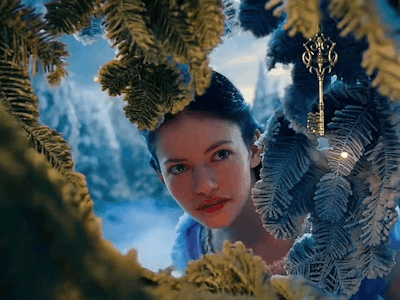
In 2018's The Nutcracker and the Four Realms, the character Clara, portrayed by Krittika ASC Mackenzie Foy, experiences a journey which can be symbolic of the winter solstice. The story begins with Clara in a dark emotional space following the death of her mother, this darkness being much like the world descending into the longest night at the winter solstice. But Clara seeks the key to her mother’s gift, which signifies as a source of life, fertility, and illumination that unlocks potential — the gift quite literally being a golden egg. Clara and her companion must retrieve the key and restore harmony to the unstable magical land. This theme of restoration, new hope, and redemption in a lot of these scrooge films, is symbolic to the Sun’s rebirth during the solstice — the return of life.
The practice of illuminating the Christmas tree with lights and ornaments mirrors the Sun's return, symbolizing a brighter future with the coming year. The infectious joy and generous acts during this festive season reflect the gratitude for the life-sustaining force that the Sun is, and the light for new hope it represents, as it promises abundance for the year ahead. The twin deities of Ashwini nakshatra are associated with rejuvenation, new beginnings, and vitality; this resonates with solar qualities, further explaining why Sun feels naturally at home in Ashwini. The Ashwini Kumaras are divine healers who bring restoration and renewal, just as the Sun sustains all living beings with its energy.
The character Robin Hood, much like the Sun, is a symbol of hope for the downtrodden, fighting off the darkness of evil and corruption. He sustains the spirit of his people by redistributing wealth and restoring their faith in justice, consistently being a force of resistance. The Sun serves as a profound symbol of redemption, perfectly embodying the cycle of renewal and the promise of transformation on earth. Its daily rise eliminates darkness, rejuvenating life and reinstituting balance in nature after its lengthy absence. Sun illuminates the paths which signify growth, healing, and change. The very pure symbolism of the Sun makes it an enduring metaphor for hope, forgiveness, and the power to provide. Robin Hood's actions literally restore the imbalance, which was created by corruption and darkness, giving the poor a chance to continue building their lives. Robin Hood stands as a symbol of light against injustice, signifying a timeless reminder that even in the face of darkness, renewal and justice are always within reach. The character Elliot Alderson is also the perfect representation of this, for anyone who has watched Mr. Robot (the only series I'd happily recommend to anyone — it's very dark though).
Merry belated Christmas! 🎄
#krittika#uttara phalguni#uttara ashadha#aries#taurus#leo#virgo#sagittarius#capricorn#sidereal astrology#vedic astrology#astrology#astro observations#astrology observations#vedic observations#nakshatra series#nakshatra observations#vedic astro observations#vedic astro notes#sun#ashwini#ketu#purva phalguni#purva ashada#venus#sun nakshatras
400 notes
·
View notes
Text
Character motivations for fictional characters
1. Revenge: Seeking vengeance for a past wrong or harm.
2. Power: Craving dominance and control over others.
3. Love and Relationships: Longing for love, companionship, and emotional connection.
4. Redemption: Seeking to atone for past mistakes and find forgiveness.
5. Survival: Striving to stay alive in dangerous or challenging circumstances.
6. Justice: Fighting against injustice and upholding fairness.
7. Exploration: Satisfying curiosity and a desire for discovery.
8. Ambition: Relentlessly pursuing success and achievement.
9. Freedom: Seeking liberation from oppression and constraints.
10. Knowledge and Wisdom: Thirsting for knowledge, understanding, and wisdom.
11. Family: Protecting and nurturing one's family and loved ones.
12. Acceptance: Craving acceptance and validation from others.
13. Friendship: Building and maintaining meaningful friendships.
14. Escape: Seeking to break free from a stifling or undesirable situation.
15. Truth: Uncovering the truth and exposing lies or deceit.
16. Creativity: Expressing oneself and bringing imagination to life.
17. Competition: Striving to be the best and outperform others.
18. Self-Discovery: Embarking on a journey to understand oneself better.
19. Healing: Seeking emotional, physical, or spiritual healing.
20. Faith and Belief: Holding strong religious or spiritual convictions.
21. Mentorship: Guiding and inspiring others to reach their potential.
22. Revolution: Fighting against oppressive systems and advocating for change.
23. Sacrifice: Putting others' needs above one's own and making difficult choices.
24. Fear: Overcoming fears and finding strength in the face of adversity.
25. Fame: Desiring recognition, acclaim, and celebrity status.
26. Identity: Discovering and understanding one's true self.
27. Empathy: Understanding and connecting with others' emotions and experiences.
28. Tradition: Upholding cultural or familial traditions and values.
29. Rebellion: Resisting authority and challenging the status quo.
#writing#writing tips#writer on tumblr#writerscommunity#character development#writer tumblr#writblr#writing advice#oc character#writing help#fictional characters#character motivation#writing ideas#writeblr#writer problems
4K notes
·
View notes
Text
Common character motivations
Revenge - seeking to get even with someone who has wronged them
Love - driven by romantic feelings for another character
Greed - motivated by a desire for material possessions or wealth
Power - seeking to gain control or influence over others
Justice - motivated by a sense of fairness and a desire to see justice served
Redemption - seeking to make up for past mistakes or wrongdoings
Curiosity - driven by a desire to learn or discover something new
Duty - motivated by a sense of responsibility or obligation to others or a cause
Ambition - driven by a desire to achieve a specific goal or succeed in a particular endeavor
Fear - motivated by a desire to avoid danger or harm
Guilt - driven by a sense of remorse for past actions or decisions
Jealousy - motivated by envy or a desire to possess what another character has
Betrayal - motivated by a sense of betrayal or desire for revenge against someone who has betrayed them.
Ambivalence - a character who is conflicted or uncertain about their goals or desires
Freedom - a character who seeks to escape from a restrictive situation or society
Fame - motivated by a desire for public recognition or notoriety
Identity - driven by a need to understand or define who they are
Family - motivated by a sense of loyalty or obligation to their family or loved ones
Discovery - driven by a desire to explore or uncover hidden knowledge
Patriotism - motivated by a love for their country or a desire to protect it
Rebellion - driven by a desire to challenge authority or the status quo
Artistic expression - motivated by a need to create or express oneself through art, music, or other creative endeavors
Religion or spirituality - driven by a desire to connect with a higher power or to live according to certain beliefs or values
Altruism - motivated by a desire to help others or make the world a better place
Atonement - driven by a need to make amends or seek forgiveness for past actions
Nostalgia - motivated by a desire to return to a simpler time or relive past experiences
Status - driven by a desire for social or professional standing or recognition.
Insecurity - driven by a need to prove their worth or gain acceptance from others
Legacy - motivated by a desire to leave a lasting impact or to be remembered in a certain way after they're gone
Survival - driven by the need to survive in extreme circumstances, such as a natural disaster, war, or an apocalyptic event
Belonging - motivated by a desire to fit in with a certain group or community
Love of knowledge - driven by a passion for learning and acquiring new information
Addiction - motivated by a compulsion to engage in a particular behavior or activity, such as drug use or gambling
Inciting incident - motivation driven by a specific event that triggers or sets the character on their journey
Fear of death - driven by a fear of their own mortality or the mortality of others
Intimidation - motivated by a fear of others or a desire to intimidate others for personal gain
Envy - driven by a desire to possess what others have or to be like someone else
Manipulation - motivated by a desire to control or manipulate others for their own benefit
Protecting others - driven by a desire to protect loved ones or innocent people from harm
Sense of duty - motivated by a sense of responsibility to fulfill a particular role or obligation.
If you want to read more posts about writing, please click here and give me a follow!
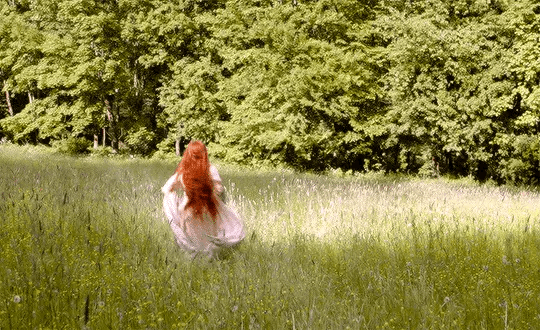
#creative writing#writing#writeblr#writerscommunity#writer things#writers#writersociety#on writing#writblr#writers on tumblr#write#writers and poets#writers block#female writers#writing community#ao3 writer#writing advice#writing adventures#writing things#writing tips#advice#my characters#original character#character design#own character#motivation#resources
2K notes
·
View notes
Text
Okay I'm finally doing the rant!
Even if somebody deserves to die (which is not our judgement to make) or needs to die for the safety of others (which is also a difficult judgement to make and must be a last resort) their death is still a tragedy and should never be praised or cheered.
You can believe that somebody's death was a neccessary evil while still understanding that it was evil nontheless. I don't think it's acceptable how many people right now are cheering for others to die. The death of an evil person is just one more person who will never be able to better themself.
I'm just begging people to research things like the French Revolution where the need for justice was turned into a desire for violence and nothing more. I'm asking you to wonder where it ends. Every CEO can be replaced by one with better security. Every politician can be replaced by one with more extreme policies to keep you in line. Your neighbor who works at an insurance company can be replaced by the boss, but her kids will never see their mom again.
Isn't that serious? Isn't that a big deal? Or will your 'great revolution' be carried out without fail, only hurting those with power that truly deserve it? Once all the big bads are gone, who'll replace them? Just another one of their buddies. Unless you take complete control so you and YOUR buddies get to make the unethical decisions! I mean, you've already killed several people to get here, might as well keep killing anyone who threatens your power! Oh- but you'd never do that. You're one of the good people! You've proven your goodness by salivating over the idea of waving a politician's head on a stick! Good people never look for peaceful solutions!
Empathy is just... gone it seems. People who disapprove of violence or question the helpfullness of this 'street justice' aren't thoughtfully debated, they're called 'bootlickers' and 'facists' and told to kill themselves.
You can believe that a system is corrupt and needs reworking without murder being your first choice! Murder should be the last choice! Maybe if you care about a system being changed you should research the system and attack it in ways that won't get people killed.
Stop cheering for murder!
(Oh, and don't bother ranting at me in the comments. I wrote the rant for you to save you the time:)
"Well as an [insert oppressed group here] what you're saying is actually really harmful due to the damage that these bad people cause the world. You don't understand the painful lives people live that make killing other human beings morally justifiable. I'm going to argue that killing people is okay, even though your original argument is towards the mindset of cheering evil acts like murder and thinking of oneself as a hero who can never make evil decisions rather than towards the neccessity of said evil actions. Some people laugh about murder to cope, you abelist! And you're also a hypocrite because you're totally okay with gay disabled people being murdered despite never saying anything that would imply being okay with that! I will continue to project my own beliefs onto you, turning you into a villain until I am pleased with the thought of your violent death! There is nothing wrong with me and I don't need to work through these issues rather than spread them online! I don't know you, but I hate you! Kill yourself, you facist!"
Seriously I could not care less what you comment. If your argument is that murder is good and people should be killed without trial and that I am somehow a bad person for questioning the morals of your belief, then... your opinion kind of means nothing to me..
194 notes
·
View notes
Note
Im slow.. when it comes to lore of Clive lmao but hey its interesting, so may i ask what's Nietzsche philosophy.. so like i can watch his philosophy, so i can understand! :D
i've been stalking your account to understand Clive but I just realize i am slow when it comes to lore LMAOO, oneee... question that is a Slight NSFW (Maybe..?), is Clive gentle when it comes of Him and MC do it for a first time?
(i just realized i change topic to add one question which is not related to Clive's lore :P)
I'll answer the second question first, Clive is always gentle! He only wants to bring you pleasure, not pain. The only time he gets a little rough is when he's feeling jealous🏃♀️.
ANYWAY.
I'm SORRY for the person I'm about to become, but get ready for a LONG yapping session (I was Dostoevskij in my past life) that probably won't make sense (keep in mind that I wanted to be either a comic artist, a psychologist or a philosophy professor...explains a lot). Half of this is from my notes when I was studying for my graduation exam💀
First of all Nietzsche is one of the most misunderstood philosophers. Why? He's either "idolized" by those red pill/looksmaxxing guys without realizing that he actually goes against their morals, or edgy wannabe "nihilists" for the quote "God is dead." (Nihilism is a form of extreme pessimism, in simple terms, it's the belief that there's no true meaning in life, nothing can be known or communicated. But if Nietzsche is telling you to destroy the old meanings of life TO create your own instead of listening to what others say, would he still be considered a nihilist? Sure, active nihilism is a thing- but in my opinion he is NOT a nihilist).
His philosophy has also been used historically for the worst things that I won't even mention. Why? his sister edited some of his last unfinished works based on HER own beliefs when he ended up in the asylum. Many think he was a "....", when- let's be real and study a bit of history- if Nietzsche's mental health deteriorated the year THAT political figure was born (1889), how could he possibly be associated with him? Literally, tf.
The reason for this is because I think many don't read or study his philosophy in the correct order, nor do they know the timeline of his ideas.
To understand the concept of the "Übermensch", you have to start from the very beginning, when he first mentions the Dionysian and Apollonian spirits- the übermensch is supposed to bring back the rebirth of the "tragic spirit". (Übermensch= overman, the highest version of oneself a person can become, the "better" version of you, basically).
What key concepts did I take inspiration from? (I say inspiration because not everything is directly related to Nietzsche, I started from his main concepts to create characters, lore etc.)
ETERNAL RETURN:
(Bad ending: The cycle ends here)
See Clive's necklace? The symbol on his bicep and the main menu? The ouroboros.
It's such a deep concept and it asks: "What if every moment of your life had to repeat itself endlessly, in the exact same way, forever?"
This means everything, every pain, every joy, every regret, would return again and again and again. This NOT about whether it's scientifically true, we don't know if we're destined to relive the same life after death. It's a thought experiment, a way to ask yourself "would I still want to live my life if I knew I'd relive my worst moments forever? How would I act?"
If your answer is no, you're not affirming your existence. If yes, you're embracing life fully. In a way, you'd try to be more yourself and live with fewer regrets, right?
DIONYSIAN VS APOLLONIAN:
(The intro of the game, Silas and Clive's conversation)
To simplify it: Think of the two hemispheres of the brain.
Right brain = Dionysian (chaos, passion, music, imagination, intuition, emotion). This side is emotional, creative, raw, deeply human. It's the spirit Nietzsche believed humanity lost.
Left brain = Apollonian (logic, structure, rules, order). This side is rational, clear, less human.
Why did Nietzsche use greek gods to describe this? Because he rejected the "classical and elegant" image of Greece we learn about in school. To him, archaic Greece was the perfect society because it embraced chaos, suffering, and the tragic. (That's why I added greek mythology :3)
He also saw greek tragedy (a form of ancient drama/theatre that expresses human suffering, fate, and moral conflict) as the perfect fusion of the Apollonian and Dionysian. This fusion created a form of art that embraced life in all its beauty and suffering.
With Socrates (ancient greek philosopher), the Dionysian spirit was killed. We began to exalt reason over everything, meaning everything had to be explained, justified, or made logical. This made humanity obsessed with truth and control, disconnecting us from the fullness of life.
"And those who were seen dancing were thought to be insane by those who could not hear the music."
Clive tried to force himself to lean more towards the Apollonian, he suppressed his emotions, tried to follow "moral rules", and tried to look "normal".
To explain the change between his younger self and current self there's an iconic quote:
"Become who you are" In the sense that in life, we constantly follow models that are necessary- because we grow through imitation. Children grow by watching, by imitating. But then, we must detach from this imitation and become who we truly are, a process of self reckoning.
After his "death", Clive starts being himself. There's a balance now, but you can still influence him to lean more towards his Dionysian or Apollonian side.
To live a full, healthy life, we need to embrace both sides:
"The tree that grows to heaven must send its roots to hell."
GOD IS DEAD:
(Who helped Clive?)
Nietzsche's most misunderstood quote.
Saying "God is dead", as he writes, implies that God once existed, or at least, that he was once central to the way humans explained the world. After all, only something that has existed can die; things that have never existed don't die. That's why Nietzsche has this declaration spoken not by an atheist, but by a madman. The atheist and the believer ARE part of the same system aren't they? One says "yes", the other says "no", but they're both within the same structure of thought, a world where God is STILL a reference point.
The madman on the other hand, speaks from outside that system. When he says "God is dead", he's not just denying the existence of God- he's saying that the world is no longer ORGANIZED around God. There was a time when everything was explained through God, when God gave order and meaning to existence. But today, that's no longer the case.
We must understand that Nietzsche, often read in an oracular and overly dramatic way, is actually a profundly coherent philosopher. His thinking is rigorous; If churches are now empty, if they became museums, tombs for god (visiting them for the "Affreschi", example: "La cappella sistina"), it's because he is dead. We killed him, or more precisely, we forgot him- because already with the scientific revolution, and even earlier with Renaissance, man placed himself at the center. We no longer live in a world explained through God, but through human reason, science and self determination. (That's why I chose literally the "forgotten God" from greek mythology. If you figure out who he is, you'll learn he actually died.)
Now if you want to learn more about Nietzsche:
His philosophy goes through THREE major phases;
- The youthful phase: Influenced by Schopenhauer (another amazing philosopher, highly recommend reading about him too), celebrated ancient greece, wrote "The Birth of Tragedy", Introduced the Apollonian and Dionysian spirits.
- Enlightment phase: Distanced himself from religion and idealism, embraced critical thinking, dismantled traditional values, wrote "Human, All Too Human".
- Mature phase: Developed his core concepts -> eternal return, übermensch, death of god, wrote "Thus Spoke Zarathustra" "On the genealogy of Morality" "Ecce Homo"
77 notes
·
View notes
Text
Saturn's Exaltation and Debilitation

Saturn works well in Libra, Capricorn and Aquarius because in these signs it fights for injustice in ways that are objectively right.
Saturn debilitates in Aries and doesn’t perform well in Mars signs, because Mars is a sign of subjectively fighting for personal conviction and defending one’s boundaries from others. Ironically enough, even Mars exalts in Capricorn, so even personal conviction when it comes to self protection should be tempered with objectivity.
The person with Saturn in Mars signs is gonna fight for injustice based on lack of proportion coming from biased personal motivations and may be completely off the mark and lack bigger perspective in understanding their own troubles. They are unnecessarily defensive and stressful to their environment. They may not understand what is generally right, they operate based on what they personally believe is right and they think their personal feelings represent the bigger truth of the universe, while in fact it’s their very biased conviction.
People with Saturn in productive signs have a better place fighting for necessary changes because they have a good, well measured cause and so their efforts will always benefit the humanity collective, because everyone on the planet benefits from even one person doing the objectively right thing, even if it’s linked to someone’s personal life. Meanwhile, if weak Saturn does the right thing just for oneself, one is not very useful to the world in general and thus their long term contributions are weaker and they will even hurt people unfairly stumbling on the way.
In truth, people with Saturn tainted by Mars have an internalized sense of shame regarding the defense of their personal conviction and their right to it, which, just like with Sun afflicting Saturn, can come from an authority figure in their youth. So they yell at everyone around them louder than necessary, even if no one around them actually cares to attack them, simply because they feel attacked internally due to past traumas and they completely lack the objective perspective to be able to see that.
Saturn is friends with Venus and exalts in Venus’ sign, because a working Saturn is a good psychologist, able to accurately discern other people’s motivations. As a result, a good Saturn takes things less personally because it realizes that people actually don’t care that much about other people, as everyone is preoccupied with their own survival. A strong Saturn simply puts up an impenetrable wall based on what they know to be objectively right, a boundary people can’t cross and acts accordingly if someone tries to breach that wall, but is unbothered otherwise.
Saturn tainted by Mars is instead convinced everyone is out to get them, because they internally believe that everyone wants to attack them for their personal beliefs. As a result they lash out easily and antagonize people when triggered, because they’re unable to keep their cool. They also lack social grace, because they can’t solve conflict productively and they add extra tension to any problematic situation due to their temper. That makes them unpleasant to be around, because in an already tense situation tension should be diffused so that people feel less burdened emotionally and can look for easiest, most productive solutions. Anger in a Mars-Saturn person obscures their clarity and makes their environment more inflamed, like pouring gasoline on an already existing fire instead of putting it out.
The only path for a person with Saturn afflicted by Mars is to become aware of their complexes and defensiveness. They need to internally validate their personal beliefs and learn to put up a wall when it comes to them, not to try to convince anyone but simply to give themselves the right to live the life they want to live. They should become aware of these beliefs and simply live by them independently regardless of anyone’s opinion. They need to realize it’s objectively correct for them to be able to have these beliefs, because after all their life is theirs and not anybody else’s, so they should live it the way they want to.
As a result, their general productivity to the world will always be decreased because this person’s individual karma is about getting into balance with themselves so that they don’t end up constantly upsetting their environment. There are no valid objective external causes they can contribute to, because their karma in this life is about healing deeply individualistic wounds of personal bias. At best, they can be good at motivating people to stand up for themselves, but they will only give that advice coming from a very personal place that relates to their own experience. Of course, one can argue that their own personality and experience is a result of a long lasting line of their own ancestry as well so their very existence is fixing some latent karmas, but the physical productivity imprint will still be decreased as their emotional complexities take such a toll.
The karma of a strong Saturn instead has the power to right wrongs down to their ancestral line and manifest to have physical, societal impact during their own time on Earth, because they have the power to correct long lasting wrongs in the environment around them, which often originate from a long time before the Saturn native even arrived into this world.
145 notes
·
View notes
Text
The science behind "Act as If": it's actually a CBT technique
Although science has yet to prove the 3D manifesting effect of the Law of Assumption, the “act as if” manifestation technique we so very often read about and practice does have some research support as a cognitive-behavioral intervention.
Cognitive-behavioral therapy (CBT) has long been a cornerstone of modern psychology and psychotherapy, offering individuals practical tools to understand and improve their mental well-being. "Act As If" has emerged as a powerful and transformative intervention technique.
"Act As If" is a behavioral strategy that encourages individuals to consciously adopt the mindset and behaviors of the person they aspire to become, even when faced with self-doubt or challenging circumstances. Whether you're seeking to enhance your self-esteem, overcome obstacles, or simply better understand the inner workings of your mind, the "Act As If" approach can be a valuable addition to your mental health toolkit.
🎀 Why "Act As If" Works (in psychology, anyway)
At its core, the "Act As If" technique is a cognitive-behavioral strategy designed to encourage individuals to adopt the mindset and behaviors of the person they want to be. It is rooted in several core principles that guide its implementation. "Act As If" requires individuals to consciously act as though they have already achieved their goals, even when they may doubt their abilities or face daunting challenges. This helps build self-confidence and creates a self-fulfilling prophecy, where the mind and body work in tandem to manifest positive change.
The theoretical underpinnings of "Act As If" are deeply intertwined with self-perception theory - people infer their own attitudes, emotions, and abilities by observing their own behaviors. In the context of "Act As If," this means that by consistently engaging in the behaviors associated with their goals, individuals can alter their self-perception, ultimately reinforcing their self-belief.
🎥🎲 The Role of Role-Playing
By immersing oneself in the character of the person they want to become, individuals can better understand and internalize the attitudes and behaviors required for success. Role-playing provides a practical and hands-on approach to "Act As If," allowing individuals to experiment with different mindsets and behaviors and assess their impact on their self-perception and real-life outcomes.
We often engage in "self-sabotage," acting ineffectively despite knowing better ways of handling difficult situations. There are many reasons for this, and one is our dysfunctional, automatic thoughts. Thoughts like "I won't succeed no matter how hard I try" or "I can't do this" can hinder our actual abilities to do something well.
For example: you believe you are too overweight to go to the gym and not feel bad about yourself, or you don't believe you can actually lose the weight you need. When you let these kinds of thoughts influence your behavior, you might find yourself avoiding situations you find intimidating for thinking they're not for someone like you, or believing it's a lost cause. "Acting as if" can help alter these dysfunctional thoughts. Instead of engaging with these thoughts, "acting as if" might have you engaged in all of the activities someone who believed they could succeed would engage in: for instance, making an appointment with a personal trainer, which would result in more accountability, a better ability to perform exercises correctly, and a more rewarding experience overall. If you were out of shape before, "acting as if" can help you get in shape sooner.
The catch in the "act as if" technique is that we can use it even if we are 100% sold on our dysfunctional automatic thoughts. We don't have to wait until our thoughts change to step into the role we'd prefer. We instead step into the role, which can result in our thoughts changing more quickly and more permanently. Better yet, we don't have to wait for the law to kick in before we get what we want.
🧸👩🏻🏫Steps for "Acting As If"
💭Step 1: Identify the automatic thought or dysfunctional belief that is getting in your way.
🔄Step 2: Identify all of the things you would do if you believed the exact opposite of that thought to be successful in your goal.
🎭Step 3: Rehearse those behaviors: Act as if. Literally role-play. You can do it talking to yourself when you are alone, you can do it in your head during mindless moments of the day; you can even do it with your eyes closed, laying in bed, and visualize yourself engaging in those behaviors. The point is to be familiar enough with the behaviors that you can use them without thinking about them too much.
🎬Step 4: "Act as if" some more. Rehearse the behaviors some more. Maybe get more creative (start dressing up as the person you want to be, make a journal of all the things that happened on your role playing day, don't feel stupid - no one has to know anyway!)
💁🏻♀️Step 5: Engage in the behaviors you rehearsed. Each time a dysfunctional thought comes to mind, smile at it, and continue as planned.
By following this you may, at the very least, come across more confidently. Most people find that in practicing this regularly, they start to disbelieve the self-defeating thoughts. Having several experiences of success is a great way to undo the assumption that you will always fail. And after a while, there's no "acting" necessary. ;)
#law of assumption#loa tumblr#neville goddard#loablr#loassumption#loass#loassblog#manifesting#shifting#4d reality#assume and persist#loa assumptions#assumption#loa advice#loa#loa blog#master manifestor#manifestation#loassblr#loass post#loass blog#edward art#affirm and persist#persistence#affirmations#affirmdaily#robotic affirming#affirmyourlife#inspirational#personal development
50 notes
·
View notes
Text
Mizu, Akemi and Gender as a weapon
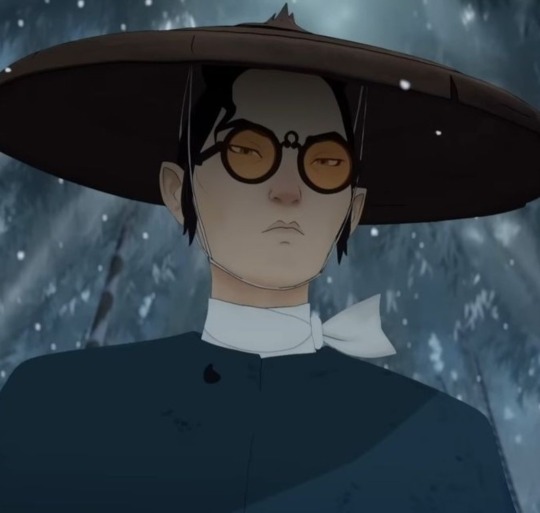
Mizu's masculinity isn't something she dislikes or is seeking to be rid of. Even at her most feminine, Mizu is still androgynous. Not limited by gender performances, stereotypes and beliefs. It's all part of her. The doting lover, the skilled samurai, the knifemaker, the patron of arts. It just creates internal conflict when she's unable to connect to her femininity in a gendered society, knowing that her femininity will be seen as weakness. On the flipside, we know Mizu suppressed masculine parts of herself in her marriage with the expectation that they'll become a deal-breaker which also wasn't healthy. Mizu doesn't need the go-ahead to be traditionally feminine, she just needs space or a person/people who will allow her be herself without nitpicking parts of her. In that vein, I also wanna address how Akemi is also masculine in her own ways.
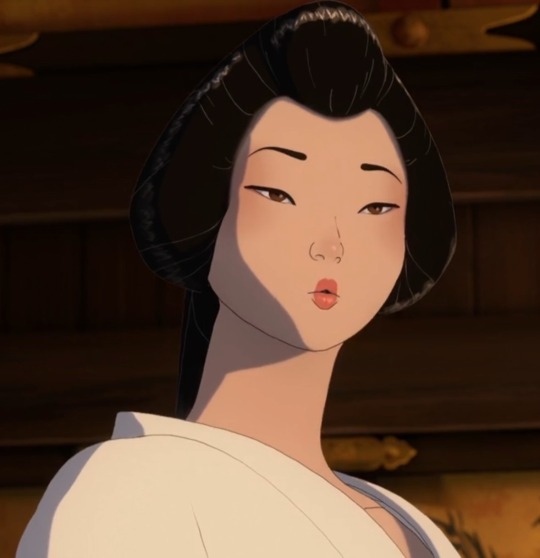
Just because she doesn't wield a sword or has an androgynous bodytype, doesn't mean that Akemi isn't masculine (the social understanding of it). She is very much so in her own right. Seki, her tutor, keeps aligning her with her father claiming that they have the same conviction in their beliefs in which their roots are unshakeable. This lays out how traits of power seeking, ambition, stark independence and intelligence that her father prides himself on are discouraged in Akemi as she's a woman. She is politically informed, highly educated and sexually dominant. She is calculative, express in her expertise at Go, something she's been better than grown men at since she was 12. Seki tells her that beyond just surviving in her marital home, she is equipped to succeed, expand her territory, find people's vulnerabilities, capture and win. That she can learn to do anything she wants and be whoever she wants, even if the goal is to become the ruler of Japan. In that same episode, Mizu is parallel to Akemi where she seeks wisdom from Master Eiji to exact an artful revenge where he proceeds to tell her that he didn't train her to be a demon or a human but he showed her how to be an artist. That revenge, swords, pots, noodles are all the same to an artist. The goal is to learn to be good at something. Anything. Mizu's pursuit of revenge is as masculine as Akemi's pursuit of power. They are both capable of learning. Of being successful. They are both elements of their own destiny. Water. Fire.
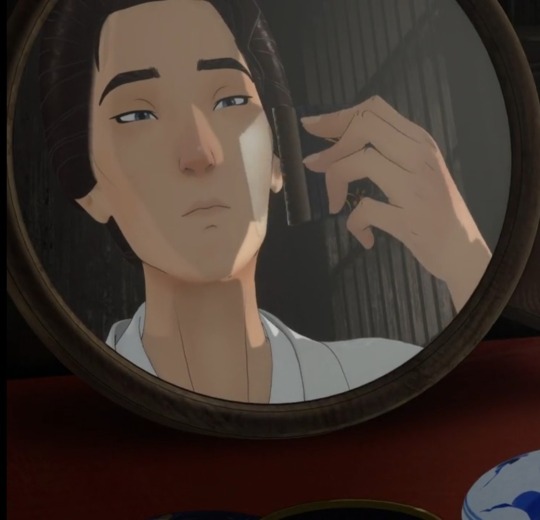
It doesn't matter what the means used are if the objective is one and the same. Akemi learnt this throughout season 1. That to evolve oneself guarantees success over only changing the scenario by running. Like Mizu, Akemi works with what she has. She is feminine presenting, enhanced through the princess finery, she can't fight but she uses her beauty, charm and wit to execute her plans and bend men to her will. Mizu attempted to maneuvere this same tactic after Mikio called her a monster, dolling up like on her wedding day to appease to his masculinity but it only pushed her towards the one thing she does best- wielding a sword to survive. Mizu knows how to fight, that is her agency, not a definitive of her gender. To fight and evolve is human, not select for a particular gender. Akemi also knows how to fight. She's trained in koto playing, singing, dancing, literature, poetry and the sutras. Her modus operandi is to weaken a man through his own hubris of thinking that she presents no threat. Which, as a personal opinion, I find a requires a tad more skill than cutting through flesh and bone. With Mizu, men brace for a fight, with Akemi, they don't even realise there was one in the first place. I posit that fighting is seen as more glorious than manipulation because it's a traditionally masculine way of dealing with things. Meanwhile, artful manipulation if rife with character bashing because femininity, according to some, should not not exist to take advantage only be taken advantage of, which again. Trash take. Needless to say, both Mizu and Akemi easily outclass the men who stand in their way.
Finit
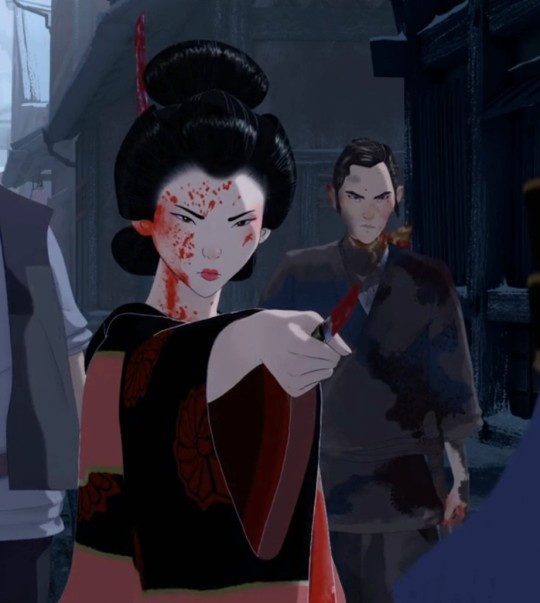
#blue eye samurai analysis#mizu#akemi#netflix blue eye samurai#blue eye samurai#mizu blue eye samurai#akemi blue eye samurai#blue eye samurai mizu#bes akemi#netflix bes#bes mizu#bes#bes netflix#blue eye samurai netflix#akemi ito
193 notes
·
View notes
Text
I Believe in Shifting - But Now I’m Questioning My Entire Worldview



Dear shifters,
I am coming here today because I would like to ask you some questions about shifting that come from my desire to deepen my understanding of it, and because of my great curiosity about the topic.
I’d be grateful to anyone willing to share their opinion with me. 🙏🏼
I’ve been reading a lot about shifting, but I would like to expand my knowledge. Since reality shifting has not yet been scientifically examined, I can rely mostly on your experiences and thoughts about it.
Though I do believe reality shifting is 100% true and real, and I think it makes sense when I confront it with what I have learned so far about this human experience on Earth, there are still so many unknowns about the whole phenomenon itself.
Let me share a piece of my personal story and beliefs. I think this will be crucial in the context of my questions because there are people who might have a completely different view of life and what it means to be human in general. What I find hard to understand might be simple and obvious to you. I really want to hear opinions from people with different worldviews because that might help me review my own beliefs and maybe find understanding somewhere outside my current perspective.
Many years ago, I experienced what is broadly called a "spiritual awakening." From that moment on, my whole worldview was put to the test, and some of you who have experienced it know how it goes. Month after month, year after year, you start to understand more about something that sometimes feels impossible to grasp. It becomes obvious that life on Earth is just a temporary journey. Though one day you die, the journey continues, as your spirit - the true essence of who you really are - does not.
I believe in reincarnation. I believe in the existence of divine consciousness. I believe we come to Earth to learn about our true nature, and that this is our goal here. About this last belief, however, I am starting to question myself. Reality shifting is seriously challenging my belief system, and I’m beginning to wonder if things were never the way I thought they were.
Let me explain. One of the biggest things I have believed for the last six years is that humans are born on Earth without knowledge of their divine origin. Everything revolves around us discovering the truth of being a part of God, the source of unconditional love, and that is basically the point of it all. Though we are divine beings, we experience life through the mind, which by its nature is flawed and limited and prevents us from seeing The Truth. Life experiences are triggers for change, to help us finally see. They are lessons we take on the path we all walk back home, which is God himself/herself/themselves (I really don’t know what pronouns to use here, as God is not a person). This way of seeing things helps me make sense of life itself.
Because, as you know, life on Earth is intense - full of pain and suffering, sometimes hard to comprehend. It is full of problems that seem to never end. Most of the people I know, and I am one of them, go through life exhausted. I’m not saying these people never experience joy or happiness, but compared to the challenges they face, those moments of happiness seem insignificant. And yes, that is supposed to be the art of living: to grow and change to release oneself from suffering.
So we have religions, practices, and tools to help transform our lives into something better. Change is possible and available to everyone. If we truly want to change something in our lives, we can achieve it. But oh man, that’s not so simple. From my personal experience, I’ve noticed huge changes since I started meditating, praying, and analyzing my psyche but sometimes I still feel like no real change has occurred at all. It’s very disheartening because you put a lot of hard work toward changing your life, and then realize your life hasn’t changed much in the last decade. You’re still dealing with the same problems.
Yes, life feels this way sometimes. For me, remembering that it all happens for a reason - that all these challenges, life lessons, emotional and mental processes happen for me - helps me see they are opportunities to notice what doesn’t work in my life so I can take steps toward changing it. Also, it's the only thing that helps me survive sometimes.
I want you to know that I have a pretty good life. It doesn’t suck entirely. Life is not 100% awful. It has never been, though it has kicked my ass way too many times. What I want to say is that life is all these things, the good and the bad. A range of many different experiences. I’ve thought about it, we have so many incredible things here on Earth: art, music, love, nature, animals, and so on. It’s hard to live a human life, but it’s not like we only suffer and there’s nothing good to reach for.
God damn it, where am I going with this? My apologies. I’m unfortunately one of those people who, once they start talking, easily go off-topic.
Let’s get to the point.
With all that I’ve said so far, here comes my biggest challenge in understanding exactly what reality shifting is.
It all made pretty good sense to me, the concepts of reincarnation and karma still do, in a way but I feel like shifting kind of contradicts them, or maybe it doesn’t. That’s why I’m here: because maybe there’s something I haven’t noticed yet. Something I don't understand yet.
From what I know about shifting, it seems there are no limits. You can shift your awareness to any version of yourself that basically exists, and these versions are limitless. There is a version of you who is Mother Teresa or Donald Trump. There is a version of you who is Mother Teresa living in the 16th century. There is a version of you who is Donald Trump, but a hippie fighting for human rights in the 60's. You get my point. You can shift to being anyone, anywhere, anytime in history. You can also shift to being someone who is not Homo sapiens and doesn’t have a human form. As you can see, no limits.
You can make yourself the partner of Kate Winslet or Legolas because there is a version of you that is already their partner. You get it.
So, let’s say I shift to a version of reality that is perfect. Of course, for everyone it means something different, but I’ll give you an example of my perfect world.
In my perfect reality:
There is no homelessness or hunger.
There are no crimes; people don’t kill others. There is no rape, no hatred, and no jealousy.
People respect nature and treat animals as equals. There is no exploitation of the Earth. There is no air pollution. Humanity doesn’t use crude oil or produce plastic, and if it does, it’s 100% biodegradable. People don’t litter. Rivers and oceans are clean and healthy.
People treat themselves with respect, help each other, and are kind and compassionate.
People respect diversity. They don’t judge anyone’s looks, lifestyle, or beliefs.
Everyone has equal access to knowledge.
Governments exist to serve their people. Nobody seeks power.
There are no wars. People live in peace.
People take care of their health, eat well, exercise, and respect their lives.
People live in communities and have a strong sense of service to others.
There are no addictions.
Women and men are equal. There’s no racial or any other form of discrimination.
Humanity treats children with absolute respect and care.
People cooperate with one another in every aspect of life.
Nobody lacks anything, but people don’t overly value material stuff.
…and so on.
The question is:
✿ Where is the struggle? Do we need any struggle in order to live? What would life in a reality like the one I described look like? Where is the challenge in all of this?
I’ll elaborate a bit because I realize it might sound silly to you, but given my personal beliefs described earlier, it doesn’t seem silly to me.
Does life have to be the way I believe it is? Or is this just the next illusion I’m meant to shed?
You see, if I choose to shift to a better reality, one that lacks all these huge problems present in my current reality, then why was I born into this reality? I believe in some sort of destiny. I believe everything happens for a reason.
You may say that if I believe that, then wouldn’t shifting also be part of it if I discovered it after all? If I shift to my perfect version of reality, wasn’t that meant to happen? Yes…but it’s not that simple.
So, maybe I’ll drop the next question here to help better explain what I don't understand about shifting:
✿ Hypothetically, let’s say I’m dying here in my current reality from a serious disease, but before I die, I shift to another reality. What happens when I die in the reality I shifted from? I stay in my new one, right? But what if in this new reality I decide to live a long life, and then on my deathbed, I shift again to another reality I scripted for myself before it happened and I repeat the whole “procedure”? Can I do this forever? It’s a little bit like reincarnation, but you stay aware of your previous lives?
You see, humans have this little thing we call ego. Ego is a mechanism driven by the need to survive (at any cost). Ego doesn’t allow us to see our true nature, to see who we really are. That’s the human experience. Without ego, we couldn’t call it the “human” experience. We would just be divine consciousness inhabiting a human body or we wouldn’t have this human form at all, because what would be the point?
One can surrender their ego while living on Earth. It is possible. It is called a state of nirvana, and it’s the last stage that ends the cycle of reincarnation. A person who achieves it realizes their true nature, which is God, and after death, doesn’t reincarnate. Simple, isn’t it? Not entirely, because you see…
If there are no limits to shifting and it allows me to shift to versions of myself with different personality traits, skills, and experiences, can I simply shift to a version of myself that has achieved nirvana? Wouldn’t that be a cheat sheet? Achieving nirvana takes a lot of dedication and persistence. Supposedly, it’s the last stage of human experience for everyone, but it takes many lives to get there. (Well, I wonder if perhaps no one would actually decide to do this because of the ego. If we could simply decide to get rid of it at will, then all of us would be enlightened already. But hypothetically, it’s possible, right?)
The same applies to shifting to a reality where you don’t have the personality traits that cause you struggle in your current reality. For example, if you are shy in your CR, you could shift to a reality where you are confident. If you have trouble focusing or organizing yourself, you could shift to a reality where you don’t have those problems. Wouldn’t this be another kind of shortcut? Wouldn’t it rob you of something significant?
And yet, what if I scripted myself to be an expert in 20 subjects, to know 90 languages, play 30 musical instruments, and be good at 15 sports? I’m probably exaggerating here, but hypothetically, I could do it. If I shift to a reality where I can play the piano at a master level, even though I can’t play it at all in my CR, then it means I’ve shifted to a reality where I already learned to play the piano. That’s why I know how to play it, I had to learn it somewhere, right? Because otherwise, how else would I know how to play?
You might say there are realities where learning isn’t the only way to acquire a skill. But what if I didn’t script it that way, and I still scripted that I have 200 different skills I’m an expert in?
I’m not sure if I’m making sense here, but if you do understand what I’m trying to say, congrats because this train of thought probably derailed a long time ago. XD
You see, all of this makes me question what I believe life is really about. It’s not just about realizing that shifting has no limits, I already understand that. But the implications are so much more complex than I expected. It makes me wonder: what is the purpose of us being here? What is the purpose of life?
Maybe there is no purpose. Maybe the purpose is to let go of the need to find purpose in everything. Who knows? Well, not me :p
This post is very long already, so perhaps I will stop here. I know you probably don’t have answers to my questions (as reality shifting is still such an unexplored area), but I would be very grateful if you decided to share your views on the matter with me <3
If you’d like to share your thoughts, feel free to leave a comment or, if you’d prefer to discuss it in a private message, you’re more than welcome to do so.
xx
#reality shifting#shiftblr#shifting community#shifting blog#reality shifter#shifters#permashifting#shifting journey#shifting realities#shifting content#shifting consciousness#desired reality#loa tumblr
25 notes
·
View notes
Text
apologies this is far from a coherent shower thought but i think it's time we like. decided to detach our identity a bit from the things we do. it's fine to just read. you don't have to be a reader. it's fine to just game. you don't have to be a gamer. you can be those things but i feel like in a quest to find ourselves and open our hearts, especially to others online (because i know, the first thing we do when on a new platform is say hi im [name] i like these things we should talk, i know, i do, my pinned post is literally that), i feel like we forget that we are more than the things we do and even the things we love. we, to borrow words from slay the princess, contain it in our multitudes.
it's a sentiment i've felt for a long time as someone who has been on the internet and in fandom spaces for a good decade now, and like. i find when we hold these things so close that they become us, we become too defensive over them. how many minor fandom disagreements spiral into threats, name calling, doxxing even? i find, especially younger users in fan spaces, tend to take even small differences of opinion and take them personally. saw someone blow up and call people awful names over believing only one person could top in a genshin ship. another left a server i was in because they disliked a popular character, and other (respectfully), decided to share why they did like her. i get that things like rejection sensitivity are a thing, but i think this failure to recognize the self as an entity apart from the things you do and the thoughts you have definitely contribute to this. phenomenon i suppose.
it's genuinely slay the princess that has given me the vocabulary to express and understand this thing i was already thinking. i think, though we are not gods, it's important to understand that we are not things so easily defined. we consist of our thoughts, our actions, our perceptions, our beliefs, and more. even the outside world's perception of us reflects some part of our nature. but not all of it. it's impossible to define oneself in one, two, three words or even an essay.
because like we don't exist in a vacuum. part of our existence is defined in our interactions with others. but not all. never all. there is no one who can truly know you, and we cannot truly know ourselves. our principles bend to the whims of circumstance no matter what we tell ourselves otherwise, so we can't decide what we are or what we would be in a situation for sure, ever. and that's not a bad thing, but if we can't ever truly know ourselves, then how can we assign such great importance to something as superficial as the things we enjoy sometimes?
we are both a constant and the capacity to change. and to take just a handful of things and call it your identity, even subconsciously, is a disservice to the self. in an effort to be seen we break ourselves down into easy (i hate to say it but) marketable pieces.
take being a reader for example. it has always felt like vague slang for booksmart, thoughtful, likely quiet and introverted as well, just as much as it means "i like to read books". theres an aesthetic to it involved, and a whole subculture. do you write in your books? do you keep them museum-fresh quality? do you read smut or classics or high fantasy or satire and what does it say about you? if you say audiobooks aren't real literature, are you signalling to others about quality and sophistication, or are you a pretentious asshole, and ableist to boot? these connotations assigned to such an otherwise benign thing about someone are i think are reflective of the construct of identity and perception. i could go on about it in a way that's more coherent but i, a student, have other things to do right now.
(does being a student make me intelligent? does it impress you to know i study medicine? what if i told you i average Cs in my classes? what if i told you i dislike patient care? what if i told you i'm not here for the money OR to make the world a better place, and that i'm here purely to serve my curiosities about the way the body functions and to absolve my obsessive need to understand just what are we? does this change what you think of me? does it matter? what if you knew the guilt i felt for seeing so much suffering, but still hating patient care enough to worry endlessly about being stuck in it as a career? am i better for it? but i have not acted on this guilt. it is a mere feeling that only i know. knew. is it different now that i've confessed it? does it matter? does any of it change who i am, fundamentally? or am i a thing detached from it all? or. as i like to believe. is it both? your shifting perceptions of me and the way i change shape and form (so much like our beloved princess in slay the princess) in your eyes, they make up me just as much as the soul or the self or whatever other philosophical name you assign to it. at the end of the day, isn't the most important thing that i am just me? both devoid of and constituted of the sum of my parts? what is found in the spaces between my cells? impulses and chemicals. is that me? is it all me? can i ever really know it? and why, why, why define it at all?)
#if you read all of that im sorry i just#needed to express this in some way#and a simple journal entry wasn't doing it#i hate journalling so fucking bad#is there meaning to any of it at all? or is it just irrational and i am wasting my time?#and at the end of the day#who gives a fuck#sorry i think the existential horror of consuming both#slay the princess#and#the stranger#has like compiled itself into an unholy amalgamation in my thoughts#and i think that like#the stranger route#which is achieved by refusing to engage with the princess at all#i think that is fundamental to what i feel about this#when she isn't perceived at all she morphs into an impression of the shifting mound#all her multitudes spiralling together until what you end up perceiving is just#unholy#everything and nothing and terrifying to behold#but even the stranger is a shadow of the whole self because you exist in the context of others#god i love that fucking game#From rain
46 notes
·
View notes
Text
Thinking about how the main points of conflict within Ink's character is how he's characterized as someone with communication issues and who has a high resistence to changes.
(i use he/they for Ink in this, since no one calls them 'they' for some reason.)
Firt of all, they're a meta character. He's aware of the outside world and lets that very clear with his general whole world mentality (a.k.a they sees people as characters within a story), so them having a hard time communicating with others is by no means surprising because, again, he's a meta-aware character that has the knowledge that everything surrounding him is automatically fictional. But one thing interesting to him and worth noticing, is that he actually shows signs of being antisocial and having an obvious disregard of people in general sense (or just, having low-empathy/remorse) to the point of being completly disconnect from society and not even seeing himself as a person/monster individual. (Making it clear that this does not make Ink a bad person by any means). You know, they even pushes people away due to his careless nature because he's aware that it hurts people, and he doesn't want it to anyone.
Also something to keep in mind, he hardly has a proper social understanding!! (Something mentioned in the FAQ). They have a hard time understanding social interaction in a typical way and that alone heavily affects his way of communication (a.k.a they're extremly blunt and straight forward). Interesting enough, this information alone heavily implied or otherwise just confirms, that Ink have deficts with Theory of Mind (which is -the ability to explain, predict, and interpret behavior by attributing mental states such as desires, beliefs, intentions and emotions to oneself and to other people-). Since social understanding and theory of mind derive from the same socio-cognitive concept but with different terms attached to it.
In second analysis, he does not react/deal well with sudden/forced changes AT ALL. It's actually a main point of conflict with Ink's character and other people -whetever or not is he able to adapt to changes in the script-. It's worth bringing up that this specific mentality of his has also to do with this previously mentioned meta-awareness and persintence on the respect of the creator's previous intentions with AU's. But he genuinely also has a extreme hard time letting changes happen and by other words, also let him be affected by them.
Anyways, this is just a long explanation to why reading Ink was a character with ASPD (sociopathy) and ASD (autism) genuinely makes me have a better understanding of him lmao.
143 notes
·
View notes
Text
I find it concerning that people are acting as if divination is a closed practice. When I was a beginner, divination is exactly how I began practicing, and i don’t regret it. Divination is ACCESSIBLE, one just has to be aware of protecting oneself. That’s all. So stop acting like beginners have never done it, if anything, doing divination gave me confidence. It was special to me to be able to connect with Eros that first time, despite the fact I was no more than an amateur.
Like, is this a new thing going around? I understand concerns to an extent, but how is someone supposed to get better at divination and connecting with the divine if they can’t even attempt it?
« You have to build Kharis » is the argument, and I understand it, but doing divination was my first step to building Kharis with Eros. It was special. And I really don’t think he minded that we didn’t know each other very well.
I feel like this is a good time to remember not everyone’s practice will look the same. Some think differently of the « dangers » of tarot readings and so on, but that doesn’t mean everyone will be effected by what YOU believe can happen. That’s YOUR belief. Stop scaring or discouraging newcomers from very basic practices with varying forms. Teach them instead.
And please, if you disagree, kindly share why you think otherwise instead of starting an argument. I’m simply sharing my thoughts.
Ps: does this mean I don’t think you need to be cautious when interacting with new entities? I absolutely think you do, but newcomers can understand that too if you just TEACH THEM. If you do it correctly, no unwanted entities can reach you. Thats my personal belief.
#as long as you’re polite I don’t really think the gods even care#helpol#hellenic polytheism#divination#paganblr#paganism#pagan
20 notes
·
View notes
Photo

The River of Separation, a Navajo Creation Story
The River of Separation is one of the many versions of the Navajo creation story detailing how the people first came up from below the earth, learned to live on its surface and, just as importantly, learned to live with each other. Versions of the story, with the same title, are told by many of the Pueblo peoples.
Navajo Hogan in Monument Valley Navajo Tribal Park, Arizona
Dsdugan (CC BY-SA)
The title of the piece refers to the river that comes to separate men from women, in the early days of the world, after First Man and First Woman argue over whether one could survive without the other. The first part of the story emphasizes the harmony that comes from people working and learning from each other; the second focuses on how people suffer when that kind of balance is lost.
Navajo Beliefs & Importance of Balance
The name Navajo was applied to the people of the regions of modern-day Arizona, New Mexico, Utah, and surrounding areas of the present Southwestern United States by the Spanish in the 17th century. The Navajo knew themselves by the name Dine (Dene, pronounced DEE-nay), "the People", the term they still identify themselves by today. They learned farming from the Pueblo peoples and the "Kisani" referenced in the story below are understood as Puebloans. Scholars Alice Marriott and Carol K. Rachlin comment on the culture and history of the Navajo:
To many non-Indians, the Navajo are what their own name for themselves, Dene, implies – they are The People. Isolated in the desert regions of the Southwest, the Navajo have survived draught and famine, the white man's diseases, and his government's boarding schools, to become the largest single ethnic unit of North American Indians and a synonym for haughty independence.
(90)
Today, many Navajo live on reservations, though they may live wherever they like and in any kind of dwelling. Historically, the Navajo lived in homes known as hogans, which were constructed of logs and mud-lathe and could be conical, rectangular, or square (for men and families), while an 8-sided (octagonal) hogan was specifically built for women. The home was understood as sacred because it had been given to First Man and First Woman by the divine in the early days of the world, and so, even today, a hogan is regarded as a holy place. This understanding is especially important in the following story as the argument between First Man and First Woman disrupts the harmony of their hogan, and that imbalance then affects all the other homes in the village.
The importance of balance is also suggested by the characters of the Twins in the story, who are "half men and half women" and define the roles of the sexes early on. As they are neither male nor female, they are also able to act as mediators once the rift occurs between the men and the women: they are the only ones able to cross the River of Separation. As such, they stand as representatives of the Holy People – those of the Above who serve the will of Johanoai, god of the sun – who expect the Earth People (the Navajo) to work with them in maintaining balance. The Twins never choose a side in The River of Separation but allow the people to work out their conflict on their own and so learn a lesson they will not soon forget.
The story develops themes and characters featured in the Dine Bahane (Navajo Creation Story) but is only one of many variations of such tales. As such, it is referred to as a Navajo creation story, but not the Navajo Creation Story. As noted, Navajo spiritual beliefs focus on the importance of balance in one's life and encouraging that same harmony throughout the earth. First, one centers and balances oneself; then one is better able to help others find their own as well as encourage balance in the wider world. Since the concept of balance is central to The River of Separation, it is easy to see why the story remains so popular in Navajo communities.
The serious themes of the tale aside, the story serves as entertainment, and the comical motif of a married couple's argument spiraling out of all proportion has been featured in stories around the world for thousands of years. This Navajo version of the "battle of the sexes" motif plays off the same arguments as the many others in world literature and is as popular among the Navajo today as, presumably, it was in the distant past.
Continue reading...
34 notes
·
View notes
Note
Hi! I remember you talking about doing shadow work (in a reply to an ask, I think); do you have any advice on how to start? Especially for someone who who has a really hard time with consistency/habits? Thanks!
For me it is not an intentional practice separate from my regular life, it is an orientation toward my own most negative thoughts/impulses/reactions. I do not believe that any thought is harmful or morally wrong to have, and so when I experience a thought that is violent, cruel, bitter, pathetic, prejudicial, short-tempered, jealous, whatever else, I accept it, and study it with curiosity rather than self-condemnation.
I notice patterns over time in what I am particularly un-evolved and unenlightened about. What hang ups do I have? What weird bullshit respectability politics or traditional gender norms do I still apply to myself or to others? Who do I fuckin hate and why?
Which of these things can I just kind of shrug at and accept as a feature of my programming and which ones do I see seriously holding back my life? That's probably the hardest part of shadow work for me. I'm very aware of a lot of my flaws and the things i'm irrationally emotionally reactive to and defensive about, but I get attached to my way of seeing things. It can be scary to become more open-minded and uncertain and less spiky. And some things just aren't easy to change even if I want them to. Part of shadow work means allowing oneself to be in an unfinished state.
Another part of it for me is accepting with a dark kind of gratitude that the world would be a pretty terrible place if everyone was like me. There is so much about humanity that I do not understand. I could never be a surgeon. I could never be a good parent. I could never be a social worker. There is so much I am so bad at. Maybe this is the Narcissism and Lack of Empathy talking, but I've had to really humble myself. I used to think I was so much more rational and less of a waster of time and resources than most people around me. Now I realize I have run on self-denial and repressed emotionality for a very long time and demanded that life have some Purpose when it doesn't. So a lot of my shadow work has been acknowledging my ultimate smallness and feebleness and just general uselessness -- i have a lot to be grateful to other people for doing, but also life has no purpose that needs to be fulfilled so i can just exist and suck for every single second that i'm alive if that's what i'm gonna do.
radical acceptance shit is definitely mixed in there, and some DBT kinda strategies. I've finally arrived at a place where I can love my dissatisfaction as a core part of me and accept that life is not meant to be happy and comfortable. we always keep moving, changing our environments to make them a little better, chasing after new passions and then getting disillusioned with them, falling in and out of love, getting lost. we're always lost. we're always making mistakes and being dumb as humans. that's like what we are. silly little freaks that make up lots of pretend games for fun but then get swept up in believing them too much. i kind of feel at peace now with the fact that i'll always be messy and impulsive and have weird beliefs and will change constantly and look back on my past with a cringe reaction every four or five years. i dont expect myself to ever arrive, because what the hell would that look like?? being satisfied and happy sure sounds a lot like being dead.
94 notes
·
View notes